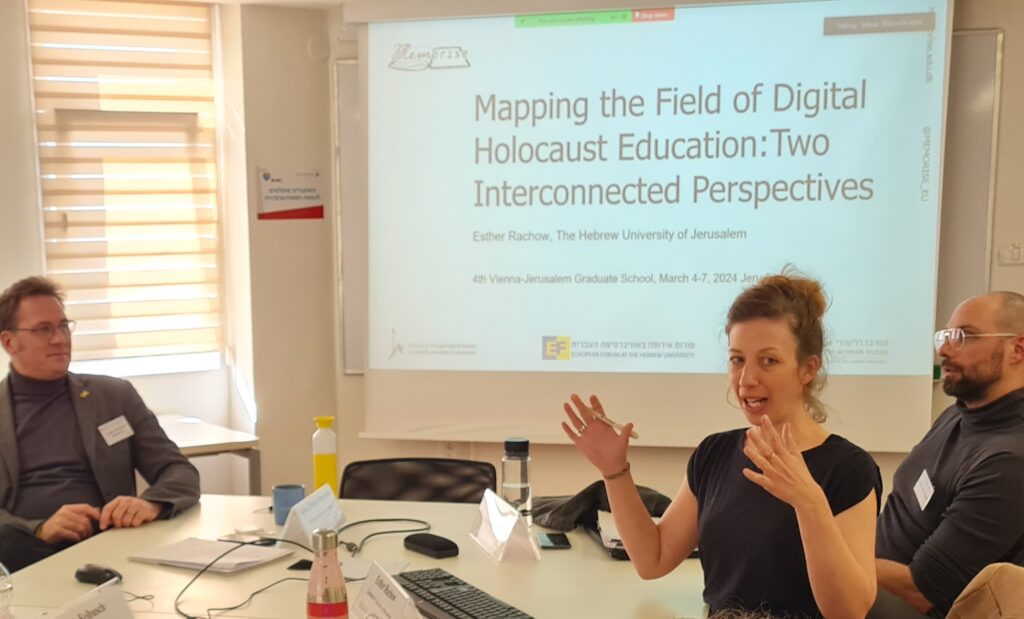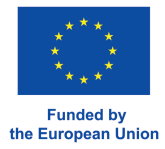Report from the Vienna-Jerusalem Graduate School
Memories are not static. Rather, they are entangled in many ways. The fourth Vienna-Jerusalem Graduate School that took place at the beginning of March 2024 at the Hebrew University in Jerusalem focused on such networks and layers of history. Every two years, young academics from Israel and Austria meet at this multi-day conference organized by the Austrian Academy of Science and the Centre for Austrian Studies at the Hebrew University to exchange ideas on their research in the field of memory studies.
This time, the Graduate School was strongly informed by the October 7th Hamas attack on Israel and the subsequent war in Gaza. Despite the situation, the organizers decided to hold the conference in Jerusalem at the Mount Scopus campus. Some of the Austrian participants took part online, but the majority of the delegation, which was led by co-organizer Dr. Ljiljana Radonić from the Institute for Culture Studies at the Austrian Academy of Science, travelled to Jerusalem in person.

In addition to lectures on transnational and intertwined memories in memorials and museums, comparative studies on cultures of history and memory, the role of memory in media coverage, the generational transmission of traumatic history and the use of anti-Semitic symbols during the COVID-19 pandemic, some lectures also dealt with aspects of digital memory culture. Geographer Rotem Mashkov presented the results of a pilot study at the Memorial and Educational Site House of the Wannsee Conference in Berlin. A German-Israeli team had accompanied Israeli, German and international visitors equipped with mobile eye-tracking glasses and electrodermal sensors through the exhibition. With the help of these innovative technologies, the research team was able to determine which elements of the exhibition the visitors interacted with more strongly (especially texts) and which also evoked corresponding emotional reactions (e.g. images and multimodal installations). The importance of the historical location for the emotional perception of the exhibition also became clear.
Dr. Martin Tschiggerl from the Austrian Academy of Science talked about mnemonic conflicts in digital games about the Second World War. He strengthened the importance of interconnecting a detailed analysis of game ecologies, their production context as well as insights about the reception, primarily by reviewing user comments and chats. In his presentation, he also discussed ethical and historiographical aspects related to “playing the past” in digital settings, in particular the question of historical accuracy. In this context, he emphasized the fictional worlds created by computer games and suggested to shift attention from debates about “authenticity” and historical accuracy to mnemonic effects and the impact of computer games on popular perceptions of past events.

The MEMORISE project was introduced by Esther Rachow, a doctoral student at the Hebrew University and MEMORISE researcher. Esther Rachow focused in her presentation on digital Holocaust education. In this context, she discussed 3D models as new digital objects that combine historical learning and memory. She particularly emphasized the importance of knowledge production and knowledge transfer with regard to digital learning ecologies, and introduced the MEMORISE 3D Prisoner Painting model as an example of enriched digitized sources that enable an examination of historical knowledge, which also includes the question of what knowledge about Nazi persecution was accessible when and how, and how it could be passed on.
In addition to Esther Rachow, MEMORISE researcher Karen Ornat and MEMORISE research student Marina Pogorelova also presented their current research projects as part of the Vienna-Jerusalem Graduate School.
In addition to lectures and discussions, there were also several excursions. On a guided tour of the Hebrew University campus, the participants learned about the multi-layered history of Mount Scopus and were able to get an idea of the complex geopolitical situation in and around Jerusalem.

A visit to Mount Herzl, with its national cemetery of Zionist personalities and fallen soldiers, offered a view into the interwovenness of the memories of the Jewish diaspora and the pre- and early state until today. In its culture of remembrance different experiences of persecution and war come together. The memorial to the victims of terrorist violence, which took on a new significance after the massacre on October 7, attracted particular attention.
In Tel Aviv, the participants of the Vienna-Jerusalem Graduate School visited the ANU Museum of the Jewish people located on the campus of Tel Aviv University. There they were able to get an idea of the heavily media-driven exhibition of diverse Jewish life and culture. In addition, the ANU had just opened its first exhibition of artworks on October 7, which added a layer of real-time commemoration to the visit. Traces of the memory of October 7 were also visible everywhere in the city centre of Tel Aviv, which the group visited as part of a walking tour of the White City, a UNESCO World Heritage Site in the middle of Tel Aviv known for its unique modern international architectural style imported by Jewish immigrants from Europe. Today Dizengoff square at the outskirts of this historic neighbourhood became the home to a temporary memorial commemorating those people murdered and abducted on October 7 and afterwards. In this way, the living multi-layered and multi-perspective memory, that was the subject of the conference, could be experienced very immediately.
The next Jerusalem-Vienna Gradaute School will take place in Vienna in 2026.
Author: Tobias Ebbrecht-Hartmann
Disclaimer: Tobias Ebbrecht-Hartmann was the co-organiser of the Vienna-Jerusalem Graduate School on behalf of the Hebrew University



One response
How did the organizers adapt the conference in light of the October 7th Hamas attack on Israel and the subsequent war in Gaza? Greeting : IT Telkom